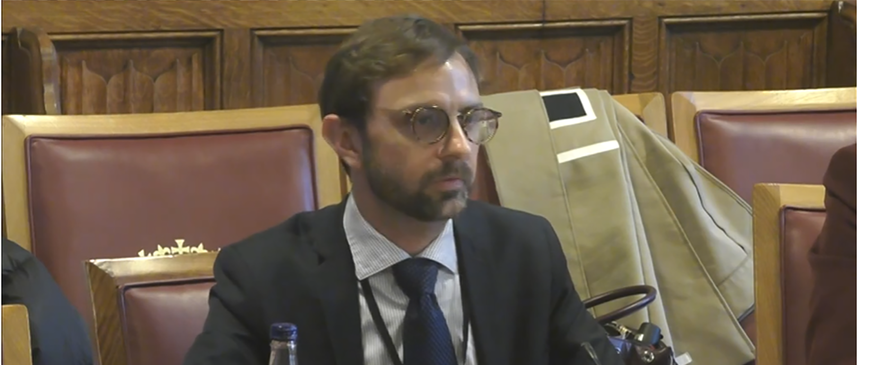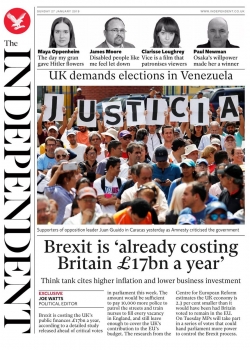Press
'Doppelgänger UK' shows Britain's economy is 2.3% smaller because of Brexit
28 January 2019
Yahoo Finance
Britain voted to leave the European Union over two years ago and on 29 March this year, it will sever ties for good. While Brexit hasn’t technically happened, it has caused the economy to be 2.3% smaller than if Brits had voted to remain in the EU.
The cost of Brexit to September 2018
28 January 2019
The Financial Times
“Britain’s decision to leave the EU damaged growth, largely thanks to higher inflation and lower business investment. The UK missed out on a broad-based upturn in growth among advanced economies in 2017 and early 2018. And the economic cost of the decision so far is sizeable, if not disastrous.” (John Springford, Centre for European Reform)
No-deal Brexit puts UK food security at risk, warn Sainsbury’s, Asda, Waitrose and M&S
28 January 2019
The Independent
Brexit is already costing the UK’s public finances £17bn a year, according to a detailed study released ahead of critical votes in parliament this week. The amount would be sufficient to pay 10,000 more police to patrol the streets and train nurses to fill every vacancy in England, and still leave enough to cover the UK’s current contribution to the EU’s budget.
El 'brexit' y las reglas de la improvisación
28 January 2019
El Periodico Internacional
La falta de guion, o de Constitución escrita, ha desembocado en una lucha encarnizada entre el Gobierno de May y la Cámara de los Comunes por hacerse con el control del proceso.
Brexit Bulletin: Changing direction?
28 January 2019
Bloomberg
The UK economy was 2.3 per cent smaller in the third quarter of last year than it would have been if the country had voted in 2016 to remain in the EU, according to the Centre for European Reform. The pro-EU think tank trimmed its estimate for the cost of Brexit from 2.5 per cent at the end of the second quarter, after the UK outperformed the hypothetical model economy. The new estimate means a weekly hit of £320 million ($422 million) to public finances, or £17 billion a year, the group said.
Brexit fears drag UK consumer confidence to 18-month low, survey finds
28 January 2019
The Independent
Brexit is already costing the UK’s public finances £17bn a year, according to a separate study released ahead of critical votes in parliament this week. The amount would be sufficient to pay 10,000 more police to patrol the streets and train nurses to fill every vacancy in England, and still leave enough to cover the UK’s current contribution to the EU’s budget. The research from the Centre for European Reform estimates the UK economy is 2.3 per cent smaller than it would have been had Britain voted to remain in the EU back in 2016.
Banks step up Brexit advice to small firms
28 January 2019
The Times
According to the Centre for European Reform, a pro-EU think tank , the UK economy is already 2.3 per cent smaller than it would have been if Britain had voted to “remain” in 2016.
Pro-EU think-tank trims cost of Brexit vote for UK's economy
27 January 2019
Bloomberg
The UK’s better-than-expected economic growth last year prompted a pro-European think-tank to trim its cost estimate for voting for Brexit.The UK economy was 2.3 percent smaller in the third quarter than had the country voted in 2016 to remain in the European Union, according to the Centre for European Reform, a 0.2 percentage point cut from the prior three months. The estimate means a weekly hit of 320 million pounds ($422 million) to public finances, or 17 billion pounds a year, the group said.
Brexit: £17bn already ripped out of UK public purse due to decision to quit EU, research shows
27 January 2019
The Independent
Exclusive: The think-tank study indicates GDP would be 2.3 per cent higher had the UK voted to remain in the EU.
Ireland dashes May’s hopes of breaking Brexit stalemate
27 January 2019
The Financial Times
Meanwhile, a new report published by the Centre for European Reform on Sunday highlighted the damage the UK economy has already sustained as a result of the vote to leave.The CER said the economy was now 2.3 per cent smaller than it would have been if Britain had voted Remain, even after a recalculation that took account of the recent slowdown in Germany.
REVEALED: What President Macron REALLY means when he says he wants an EU ARMY
24 January 2019
The Express
European army expert and researcher for the Centre for European Reform Sophia Besch says the 'European army' was initially coined as an umbrella term for progress on EU defence co-operation. However she has noted that the misuse of the term has been causing considerable problems.
Divided Britain will be weaker, poorer after looming Brexit
23 January 2019
The Asahi Shimbun
With the March 29 deadline for Britain's leaving the European Union fast approaching, it is still uncertain whether the exit will be a hard or a soft one. The Asahi Shimbun interviewed Charles Grant, the head of a British think-tank, to ascertain what can be expected from the Brexit as well as the possible economic impact and other effects.
Italy accuses France of 'Impoverishing Africa' as migration tensions erupt
23 January 2019
Voice of America
Analyst Luigi Scazzieri of the Centre For European Reform says while there is opposition to the CFA franc in some African countries, Di Maio’s accusations are misleading. “Now there’s two reasons for that. One of them being that at the moment the latest data suggests they (migrants) are not from countries using the CFA franc. And the second point is that in any case, if countries remain poor, migration is actually lower,” Scazzieri told VOA.
Theresa May offered plan B for Brexit. It looks a lot like the defeated plan A
21 January 2019
The New York Times
“I think her strategy has always been to postpone the vote until the very last minute, so that even those members of Parliament who are skeptical about her deal, but don’t want there to be no deal, would think twice about voting against it,” said Agata Gostyńska-Jakubowska, a senior research fellow in Brussels for the Centre for European Reform, a London-based research institute.
After that defeat, even more reason to hug the EU close
20 January 2019
The Sunday Times
The influential Centre for European Reform argues that the only option for the prime minister in getting a withdrawal agreement through the Commons will be to further blur her red lines, so pushing Britain towards a softer Brexit.
PIIE: Trade Talks Episode 68: Brexit votes for uncertainty
19 January 2019
Soumaya Keynes and Chad Bown discuss the rocky departure of the United Kingdom from the European Union. Sam Lowe (Centre for European Reform) joins for an update on the latest political developments as Britain approaches the March 29, 2019 deadline. They then speak with Meredith Crowley (University of Cambridge) and Kyle Handley (University of Michigan) about new research on the economic impact that Brexit-related uncertainty has already had.
Zu viel versprochen
19 January 2019
Die Welt
„Es war klar, dass es hart werden würde, über 40 Handelsverträge bis März fertig zu haben“, twitterte Sam Lowe vom Centre for European Reform.
Polskie Radio: UE wobec zawirowań wokół Brexitu w Wielkiej Brytanii
19 January 2019
Agata Gostyńska-Jakubowska a senior research fellow at the Centre for European Reform spoke to Polskie Radio and explained what the Commons’ decision to vote down the withdrawal agreement might mean for the article 50 process.
UK can delay Brexit without holding Europe elections, say lawyers
18 January 2019
Financial Times
"In some of the key member states, senior officials believe that if the European Council wants to give the British an extension beyond July 1, the election issue could be solved in a one-page protocol that could be ratified relatively quickly,” said Charles Grant of the Centre for European Reform. “This would mean the British would not have to hold elections themselves.”
The Blame for Brexit
18 January 2019
Barron's
John Springford of the Centre for European Reform estimates that the dwindling appeal of the UK as a place to do business since the June 2016 referendum has already lowered British living standards by about 2.5% relative to what they otherwise would have been.
















